Wednesday, June 15, 2016
Each Father's Day, we present the Guys We Love issue, which highlights men who are making a difference in the community.
This year's batch is no exception. In this issue, we have everything from podcasters, to Jackson State University's dean of undergraduate students and cyberlearning, to men who serve as liaisons to factions of the community.
Each of these men makes a difference in our community just doing what they do, whether it's fighting for social justice or talking about Jackson's issues. They are only a few examples of the inspiring men in the Jackson community, but are outstanding ones, nonetheless.
Celebrate the important men in our lives this year by getting to know these gentlemen.
Beau York
For Beau York, co-owner of Jackson-based podcast network Podastery, creativity and technology often go hand-in-hand.
York, a Jackson native, graduated from Mississippi College with a bachelor's degree in marketing in 2006. He then accepted a position in sales at C Spire Wireless before transitioning to product development and marketing few years later. Three years ago, he made the decision to leave the company in order to focus on Podastery.
"I saw a lot of potential in podcasting," he says. "I had been listening for ... close to 10 years at that point. ... There was this unique sense of trust. I felt as though the podcasters I was listening to were friends even though I'd never met them. This kind of emotional reaction that it got from me, I recognized that as the same kind of emotional reaction that any marketing campaign would dream of."
However, despite the inherent benefits of the format, he noticed the industry wasn't taking off and wanted to see how he could help it mature.
His initial goals were to create iTunes-featured content, to have a podcast with more than 100 episodes and to create a podcast for a small business. For the latter, he brought The Country Squire, Tobacconist, on board. In bringing the spirit of the mom-and-pop business online and engaging with existing customers, the business inadvertently gained an international audience, as well, he says.
York, 32, also created one of Podastery's flagship series, "Let's Talk Jackson," which features interviews with a variety of local artists, activists and entrepreneurs. Recently, the business released an app, the Satchel Podcast Player, which allows users to discover content based on their location. The app also won a grant from the John S. and James L. Knight Foundation, an organization that works to create informed and engaged communities. He also is volunteering to teach Mississippi Youth Media Project students to podcast this summer.
York enjoys spending time with his wife, Christina, and their two children.
—Amber Helsel
Robert Blaine
Beyond serving as Jackson State University's dean of undergraduate studies and cyberlearning, Robert Blaine also holds the distinction of being one of the only Suzuki Method-trained trombone players in the world. He says the method is all about teaching children to be musical before they learn to read notes.
"It focuses on technique and ... the mechanics of playing an instrument, and it uses a lot of playing by ear before you learn how to read," Blaine says. "... It starts children very, very early, so a lot of kids start string instruments with the Suzuki Method as early as 3 years old."
Blaine started playing the trombone at the age of 4. "That's pretty unusual because the instrument was actually bigger than me at the time," he says.
He received his bachelor's degree in music performance from Indiana University in 1989, a master's degree in the subject from the Catholic University of America in Washington, D.C., in 1994 and a doctorate degree from the University of Rochester in New York in 1997. He began working as an orchestra conductor and professor of music for JSU in 2004. In 2012, he became the interim associate dean for the College of Liberal Arts; in 2013, he became the special assistant to the provost for cyberlearning; and in 2014, he accepted his current position.
His dissertation for his doctorate degree was on converging the arts, technology and education. For it, he wrote three virtual-reality computer games that helped teach complex solo trombone works.
He says the work he does at JSU is about that same idea. He uses technology as a vehicle to enhance education. "It's kind of a really large version of what I did for my dissertation," he says. "I didn't expect ... to ever be able to do that. I wasn't looking for that opportunity."
Blaine, 49, also serves as an Apple Distinguished Educator, which allows him to look for ways to create high-quality education opportunities for students regardless of their backgrounds.
"A lot of education is the quality of what students are able to access," he says. "It depends on the amount of privilege they have, so low income students don't necessarily receive the same quality of education as far as what they have access to, as (do) students that have a lot more privilege. My goal is to use technology in ways to level the playing field."
—Amber Helsel
Emad Al-Turk
Jackson is home to the International Museum of Muslim Cultures, the first Islamic history and culture museum in the United States.
Emad Al-Turk is the co-founder, along with Okolo Rashid, and current president and chief executive officer for the museum, which opened in April 2001. Al-Turk says its purpose is "to change Americans' stereotypical depictions of Islam and Muslims."
Al-Turk says he felt the need for the museum before the 9/11 attacks, but the misinformation following the attack showed him there was an even more profound need to educate his community about Muslim culture in the U.S. and around the world.
"There are 1.6 billion Muslims in the world," he says, adding that Americans get their knowledge of Islam from just a small portion of that world. He wants to fix that.
Al-Turk was born in Palestine and went to high school in Kuwait before moving to the U.S. in 1977. He moved back to Kuwait after receiving his bachelor's degree in civil engineering from the University of Mississippi in 1980 but returned to Mississippi in 1983 and has lived here ever since. He also earned a master's degree in the civil engineering from Mississippi State University in 1987 and a master's degree in business administration from Millsaps College in 1997.
Al-Turk, 56, has owned and operated a variety of business, from engineering-consulting firms to ice cream shops. He also served as a board member for the Mississippi Religious Leadership Conference and the William Winter Institute for Racial Reconciliation, but his work at the museum takes up much of his time.
Al-Turk and his wife, Karen, live in Ridgeland and have two daughters, Amanda and Sarah, two granddaughters, Presley and Harper, and two grandsons, Sutton and Hayes.
—R.H. Coupe
Thomas Price
Thomas Price, a Belhaven resident who works as a project manager and designer for Hotel and Restaurant Supply Jackson, has spent the past year working with popular local restaurants such as Amerigo and Char. Price's company helps design interior layouts and sells and installs equipment for restaurants.
Price had been working with architectural firm Cooke Douglass Farr Lemons as an intern architect before he was laid off in September 2015. Early this year, a former coworker from CDFL who had started working for Hotel and Restaurant Supply Jackson contacted Price to offer him a position with the company.
Originally from Vacaville, Calif., Price, 39, attended Mississippi State University and graduated with a bachelor's degree in architecture in 2003. "I've been fascinated with buildings ever since I was a boy," Price says. "I look at a building like a puzzle with many pieces to it, and seeing how things go together in a building is a process that brings a great feeling when you can properly grasp all the complexity of it."
In addition to working on improvements for restaurants in the Jackson metro area, Price also joins with other local podcasters to record The Co-op podcast once a month at graphic-design company Land vs. Ocean, which focuses on issues in Jackson. He is also one of three co-hosts for the Token Talk podcast, which Price describes as "(podcasters) with three cross-cultural backgrounds who provide social commentary from a minority perspective."
The weekly podcast, which is available on Satchel, Soundcloud and iTunes, focuses primarily on current events, both nationally and around Jackson.
"I think Jackson has great potential and anything I can do to help it grow, I will," Price says. "I love to take people around, show them midtown and Fondren, show them places like the Apothecary, which I think is one of the best craft bars in the nation and can serve up things to brighten up anyone's day. Living and working in Jackson is a big deal to me, and I love being able to take part in the community and everything that goes on here."
Price has two daughters, 10-year-old Madalyn and 16-year-old Jocelynn.
—Dustin Cardon
Julio Del Castillo
On any given Sunday at Battlefield Park during the summer, one may find a crowd of sports fans, vendor trucks stocked with food and soccer tournaments on the fields. Mississippi International Soccer League meets in this park, providing the Latin community of Jackson a space for cultural communion and a rivalrous game of soccer.
Since Hurricane Katrina, many Latinos from New Orleans and the Gulf Coast relocated to Hattiesburg and then the Jackson area. With rising popularity in soccer, Efren Nunez and Julio Del Castillo created MISOL as an opportunity for the local Latin community to enjoy food, culture and soccer. "I was looking for my community," Castillo, vice president of MISOL, says, "and I decided to create this soccer league with my friend Efren."
After traveling around the South, Castillo, born in Peru, moved to Jackson in 1993. The 55-year-old is the current president of the Latin American Business Association, also known as LABA-Link, a development community-service group that strives to connect individuals and the Latin American business population to the greater business community of Mississippi. He is also a project officer III for the state.
At one point, MISOL had 16 participating teams, along with an audience of about 200 people. The players (usually labor, construction or restaurant workers) are from Central America, Mexico, Peru, Africa and other countries, so "people can interact with their own nationality," he says. Now, only six teams commit to the tournament. Due to high rates of immigration issues, deportation and police profiling, some Latinos are afraid of leaving their houses. Nevertheless, Castillo is hopeful about MISOL. "It's like a community union ... to keep from trouble," he says. He encourages people to register now for the soccer tournament, which begins in July this summer.
Castillo has three children: Andrew, 22, Sara, 24, and Katherine, 20.
—Christopher Peace
LaDarion Ammons
Margaret Mead once said, "Never doubt that a small group of thoughtful, committed citizens can change the world." LaDarion Ammons, a Jackson native, uses these words constantly as a reminder to himself and others that they must step up and try to bring about change.
Ammons, 24, is a graduate of Jim Hill High School and Mississippi State University, where he received a bachelor's degree in political science with a minor in African American studies. He is currently pursuing a law degree from Mississippi College's School of Law, from which he will graduate in May 2017.
Beginning in high school and continuing through college, Ammons served as a mentor for other young people. In March 2015, Ammons and his high-school friend, Carl Williams, 25, were able to incorporate Brothers of MS, an organization that mentors youth between the ages of 10 and 18.
"When I got back to Jackson," Ammons says, "I realized there were a lot of mentoring organizations, but not (ones with predominantly younger mentors). We surrounded ourselves with Jackson Public Schools alum and looked at innovative, creative ways to mentor."
Ammons is the son of Charles Ammons III and Carolyn Ammons, local business owners, and brother to Tabitha, Jackie and Charsity Ammons, and Charles Dulaney. Ammons says his close proximity to family is part of what makes him appreciate living in Jackson. "I have a lot of family in Jackson," LaDarion Ammons says. "I get to work with my dad and his businesses, I get to give back. ... To me, there's no better place to be."
—Adria Walker
Melvin Robinson
Melvin Robinson refers to himself as a creative. This title is fitting for the 29-year-old entrepreneur who has managed to hone several skills, including photography and videography. His passion for these skills were aroused at an early age when he was gifted his first camera.
He says his mom bought him a mini camcorder for Christmas, and he liked it. He started playing football and got out of photography and videography for a little while but later got back into them.
The Jackson native graduated from Provine High school in 2005 and went on to pursue a degree in English at Hinds Community College but did not finish. Robinson says from here he decided to work on perfecting his artistry with the few skills he had learned over time.
"I was a music artist, but I did not have the budget to pay people for certain things that I wanted done," he says. "I decided to do it myself."
He currently works as an administrative clerk for the City of Jackson while managing all aspects of his own company, Canis Canem Edit Productions, which was established in 2014.
Working closely with other local influencers, Robinson has been behind several projects, including Mississippi Road Map—a program that helps low-income families—where he created a short-form documentary for the company. He also worked with the We Are Jackson Campaign, hosts his personal podcast, The Roguish Gent, and is the producer for the local web series, LateNight JXN.
Robinson stresses the importance of community and is thankful he is a part of helping change the narrative in the city. "I think sometimes Jackson isn't seen in the most flattering light, and if you control the narrative, you can control the way people see you," he says. "Jackson has its issues, like every city, but whoever controls that narrative gets to tell that story."
—Danie Matthews
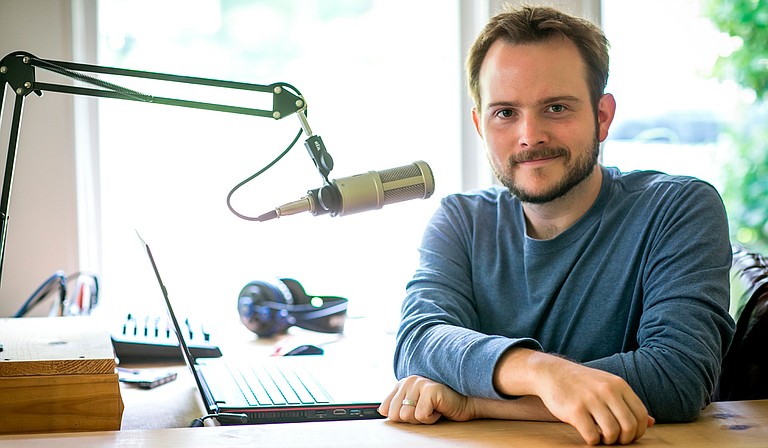
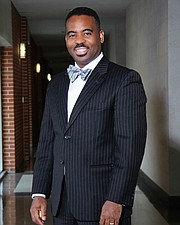
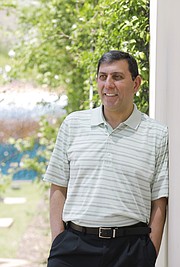
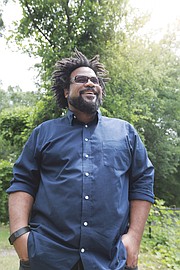
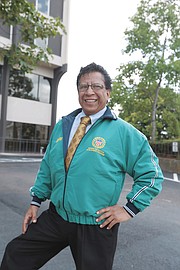
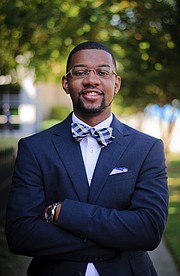
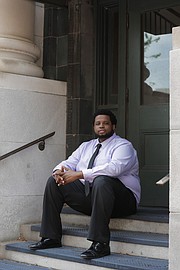
Comments
Use the comment form below to begin a discussion about this content.
Sign in to comment
Or login with:
OpenID